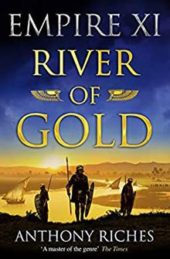Sons of Rome by Simon Turney and Gordon Doherty.
The first thing that strikes the reader at the outset of this masterful novel is that two distinct voices narrate it. Not only are these the voices of the two protagonists Maxentius and Constantine, friends in boyhood, foes as men—both Emperors at one time or another—but also the voices of the men who have brought them to such vivid life. Gordon Doherty and Simon Turney each tell their respective character’s story. This interweaving of style, character and first-person narrative is, to put it mildly, unusual and impressively effective. Each author, a best-seller in his own right with awe-inspiring expertise in the periods they write about, brings his subject to multi-layered and unforgettable existence. Readers experience the tracing of the characters’ adventures from boyhood to manhood and, ultimately, to their fateful meeting on the Milvian Bridge on the northern outskirts of Rome, October 28, 312 CE.
Although Sons of Rome, the first of the Rise of Emperors trilogy, opens on the bridge, it seems that it will take two more volumes for us to return there in the company of our two fated heroes. However, this is not to say that this initial narrative lingers over childhood adventures or the pains of growing up in the Late Empire. Both young men are the offspring of noble houses, their parents of aristocratic and imperial importance. This means that each narrator experiences, first as a witness and then as an actor, the brutal world of Imperial Roman realpolitik and the battles that must be fought because of it. Sons of Rome demonstrates that battles are fought just as fiercely in the private rooms of palaces, the back-alleys and docksides of cities and ports as they are on the fields where legions clash so brutally and vividly.
Doherty and Turney have a vast canvas to work with, which stretches from the burning deserts of the Sassanid Realms on the Empire’s eastern and southern borders to the icy battlefields of Britannia and Gaul. Paired with this historical goldmine at the heart of the driving narrative are the actions of the men—good and bad, mad or just plain evil—who hold ultimate power; what they do to get it, what they are forced to do to keep it and what happens to them and theirs when they lose it. The book teems with such men, the women who stand beside or behind them and the cities they choose as their bases—everywhere from York and Trier both with their fortifications via Nicomedia with Diocletian’s persecution of the Christians to (ultimately, one suspects) Constantinople. But, at the heart of this first part of the greater narrative, lies Rome—just as it should. Overlooked and undervalued by the later emperors, but still the prize that each of our youthful storytellers burns to possess, as a statement of Romanitas; either as a place or as an idea, or as a simple powerbase. Ultimately to each man, it is well worth killing—and also, of course, well worth dying for.
Imagine, if you will, that General Lew Wallace and Robert Harris might somehow have worked together so that Judah Ben Hur and Marcus Tullius Cicero could each tell their interweaving stories of power and politics, brutality and battle. That’s pretty much what you have here, and I cannot recommend it highly enough.
Peter Tonkin is an established author with experience in writing page-turning historical fiction and gripping thrillers. His latest book is The Anger of Achilles.
Sons of Rome by Simon Turney and Gordon Doherty.







